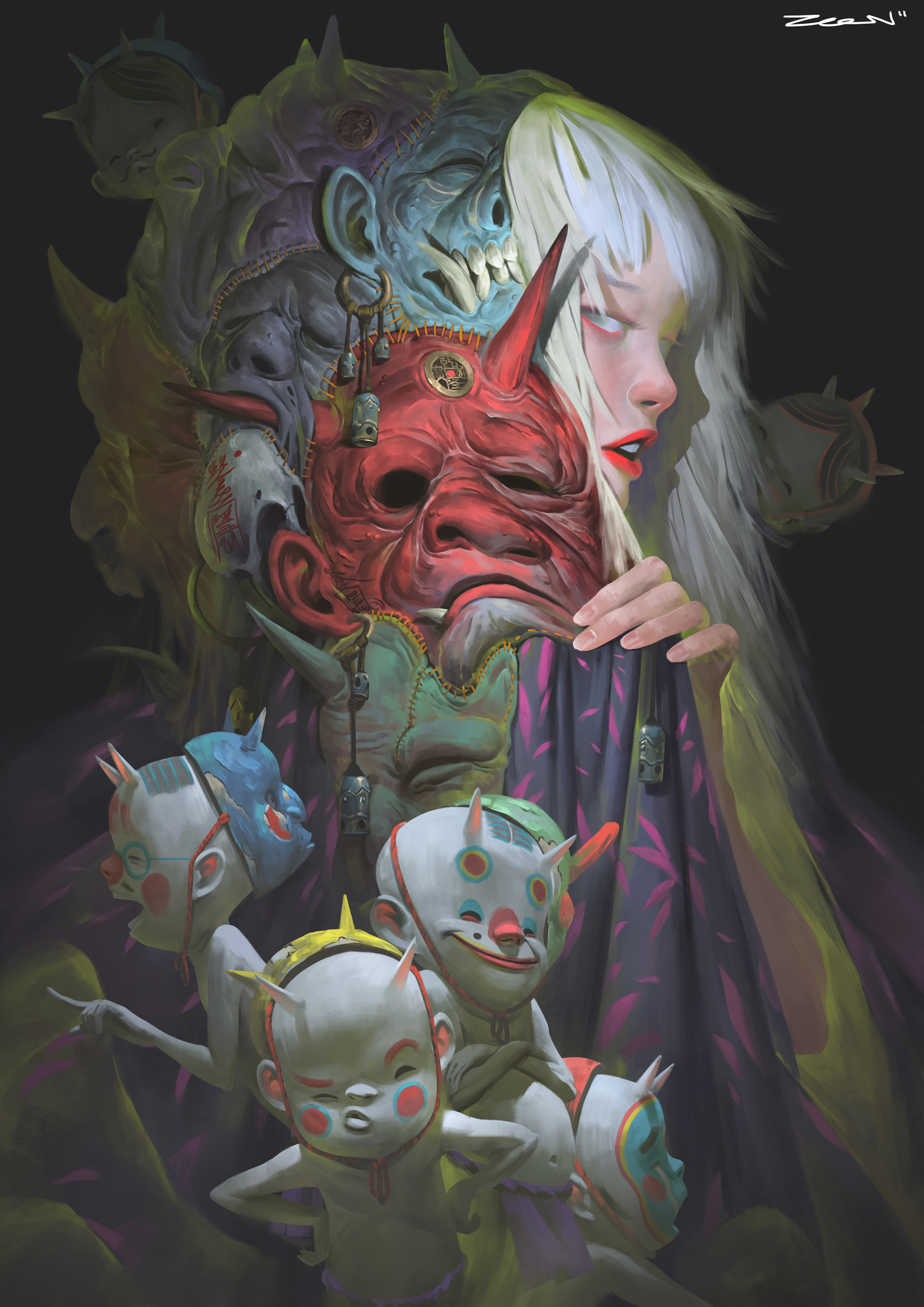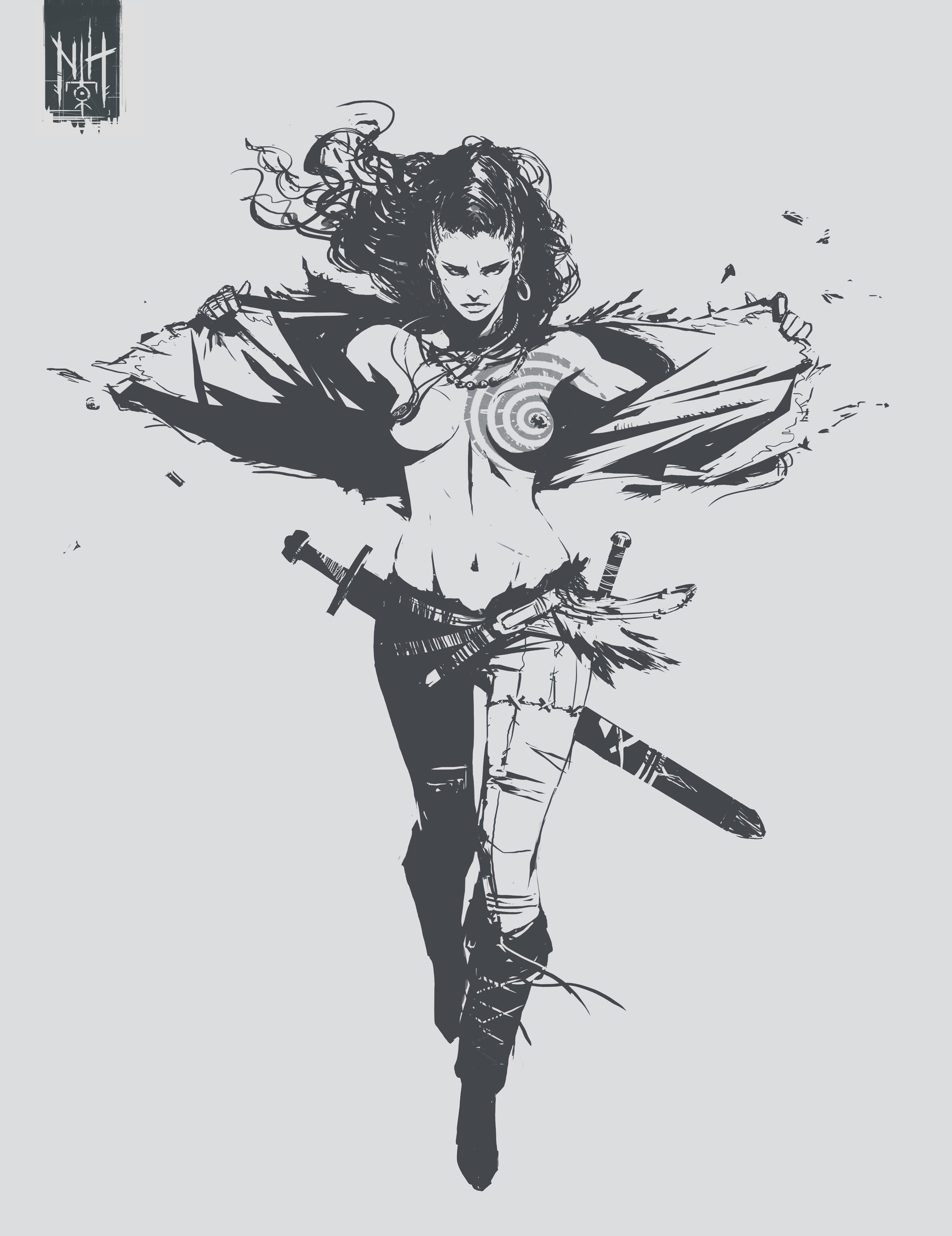This isn't my attempt at making these fit on a 2 page spread. This blogpost is me writing down the 1st draft of the WML's most basic rules. It's unlikely all of this would go into the 2 page spread, and what does likely not as it's written below.
As this is a rules synopsis, this is only going over the rules at a shallow level. We Mortal Legend's, as a book, will likely have all kinds of different smaller rules for GMs to make use of as they wish. For example, rules for chasing things won't be included in this post, etc. This post will not go over Aesthetics (coming soon), Saga stuff, and the special rules that come from both. A lot of the flavor for the game will come from Aesthetics and other small bits in the book, so the below is more how I run things without all the spice.
 |
| Things are about to get a little weird.. |
We Mortal Legends - Rules Synopsis
We Mortal Legends uses a d20 roll-under-attribute mechanic, where you must roll under one of your 4 attributes to succeed on a difficult task. The GM will at times give you a modifier to add to your roll to represent difficulty at achieving the task.
The Game Master (GM) will describe a scene and situation to the Player Characters (PC). If the PCs interact with it, the GM will ask each one in turn what they want to do. PC's then describe what they want to do, which usually consists of moving somewhere and doing something. If that something requires a roll, the GM will call for it. Rolls are rarer in We Mortal Legends than in other systems; only call for one if failure is interesting, the action is resisted or doubtable, and if there is pressure on the PC to succeed.
Helping others is done by another PC rolling as well, and applying any keywords. If one PC succeeds, all PCs do.
Group checks are checks the entire party makes. As long as 1/2 of the party (rounded up) succeeds, everyone does!
PCs consists of attributes, keywords, saves, hit die, a legend, and their AC.
Your attributes, which cannot raise above 18 for PCs, are:
- Savvy, which is your character's skill, intelligence, and ability to do nuanced things.
- Athletics, which is your character's endurance, strength, and coordination.
- Weird, which is how supernaturally capable your character is.
- A special 4th attribute unique to your campaign/setting, decided at the start of the game.
Keywords are words that help define your character, like "Coward" or "Mercenary." If you can apply a keyword to an action you're undertaking that requires a roll, you roll an additional d20. If you succeed on one, you succeed on the roll. If you succeed on both, it's a critical success!
Saves require you to roll a certain range on a d6 whenever your character is in danger that they can't otherwise escape. Every campaign has 3 saves. These are decided at the start of the campaign by the group!
Hit die determine your character's hit points, and the hit points for other creatures. A hit die is a d6 that you roll, and the number generated is your hit points. When your hit points reach 0, your character dies, triggering a death mechanic. You can heal by spending 5 minutes patching yourself up, raising your hit points to half the maximum. To get further healing you'll need special tools, abilities, or a week of rest!
Death Mechanics are unique to each campaign and are decided by the table when the campaign begins. Some of these open up the way to more adventure, make your character stronger, or give you another chance at life.
Legends are archetypes applied to your character. These give you special methods to use for overcoming obstacles. Each legend has a Character Advancement Table (CAT)--a d100 table that you spend Experience Points on to gain new character features. The first 50 options of every CAT are the same, and options 51-00 are unique to your legend!
Armor Class (AC) is a pool of points that you can use to reduce damage. Your AC is calculated by taking every point of Athletics you have above 10 and then adding your armor AC bonus to it. When you take damage, you reduce your AC by the amount you want to decrease the damage by. You regain 1d6 AC whenever you spend 5 minutes to patch yourself up, and full if you spend an hour taking care of your armor. If the GM targets the player with an attack, the player will roll under Athletics (usually with a modifier) to see if they dodge away or need to use AC to survive!
Experience Points (XP) are gained at the end of every game session. Every We Mortal Legends campaign has 3 methods of gaining XP. 2 of them are picked from the book, and the 3rd is decided by the table. By spending XP=1/2 the 10's digit of a feature on your CAT, you can get that feature directly!
Damage die are rolled whenever a PC deals damage to something. These are d8s. When you make an attack, you roll under your Athletics. You then add how many points you rolled under by and add that to whatever you roll on your d8.
Tools help the PCs do things that they normally can't. They are broken up into 4 categories:
- Weapons have unique tags to them, giving weapons special properties when used.
- Armors add to your AC pool and can have special properties natural to them.
- Simples are basic tools, like waterskins or healing potions, that PCs use.
- Utilities are advanced tools, like those of an alchemist. Roll 3d6 under Savvy to use them; if you roll doubles or triples, you get bonus effects! If you take your time using Utilities, there is no way to fail, but roll anyway to see if special things happen!
Encumbrance defines how many items PCs can carry. Calculate your encumbrance by adding half of your Savvy score to your Athletics. Items will take up differing amounts of these slots! If you have more items then you do slots, you are over encumbered and add +4 to any Athletics checks you make!
Conditions are status effects that impede PCs. Conditions take up inventory slots and have special effects depending on what they are.
Esoteries are supernatural effects, items, or abilities, split up into 8 defined groups. When a campaign begins, the table decides on 1-3 Esoteries that the game will use. Each Esotery has different mechanics and purpose behind it! They are:
- Miracles, or godly interventions that shake up the situation.
- Psionics, or mental powers used by characters.
- Sorcery, or powerful spells that warp the world.
- Folk Wises, or random bits of knowledge that work, like a circle of salt to keep out demons.
- Mancy, or divination through different means to learn different things.
- Curses, or dangerous supernatural effects that plague characters.
- Curios, or magical items with different abilities.
- Pacts, or interacting with spirits or other supernatural entities for power.
Edge Cases are common things the player's may want to do, like hiding or grappling creatures. There's a lot of these, and only a few will be covered in the greater rules. For the two above, see:
- Hiding (including moving around sneakily) requires a roll under Savvy. For every point you roll under, another point is added to other creature's Savvy rolls to find you.
- Grappling (or otherwise subduing a creature) requires a roll under Athletics. For every point you roll under, another point is added to other creature's attempts to escape. Creatures grappled are considered to be subdued.
Traveling requires one PC to serve as the guide if there is not one already. The guide will roll 2d12 under Savvy. On a failure, 1d6 hours/days/months (decided before the roll) are added to the trip's length. If doubles are rolled and under Savvy, a shortcut is found. The GM should have something prepared (either from tables or their own work) in case either happens. This traveling check is made whenever PCs encounter something on their journey.
Random encounters happen if one of the dice for the traveling check are above a certain number. The lower the number, the more dangerous the journey, and this number can change throughout the journey! The GM rolls a random encounter check this way with 2d8 instead of 2d12 if the PCs are in a dungeon of any kind.
There is no encounter initiative. The flow of the game remains fluid even when something is encountered! It is the GM's responsibility to ensure everyone, including NPCs and/or monsters, get to go at least once before someone goes again.
Helpers are NPCs that the party either pays for or convinces to help them! These are given HD, AC, and a blurb about what they can do.
So that's it for the basic core rules. Here's an example of an optional rule that will be found in the book (or at least the 1st draft of it):
Morale is rolled whenever a creature is reduced to below half their maximum hit points from any damage source, or when specifically tested by a unique ability or feature. This includes PCs! Test morale by rolling a d6 under their remaining hit points. On a failure, they are panicked, a condition that adds +4 to all rolls. Characters can calm down only when they believe they are safe again, requiring one of the following three methods:
- Another character rolling a d6 under your hit points as they try to console you.
- Exiting the situation entirely without being followed.
- Making whatever harmed you exit the situation entirely with no chance of it returning.
Anywho, that's what I'm thinking for now. I'm going to start playing these immediately with a couple of my groups as soon as I have some more legends (formally known as classes) and other little bits made, but that's the core. Don't be afraid to share thoughts below!

Very Nice.
ReplyDeleteLooking forward to seeing the complete package!